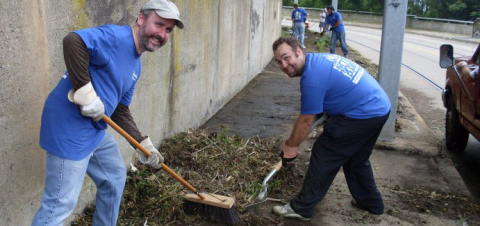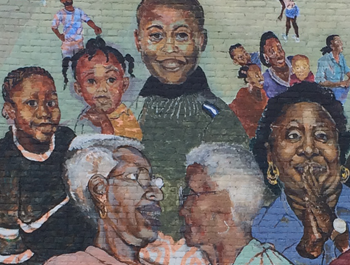Image

Colin Kelley, CEO, NeighborWorks Western Pennsylvania
Challenge: To revitalize two struggling Pittsburgh neighborhoods by investing in people and leadership within those communities.
In the space of just a few decades, two adjacent Pittsburgh neighborhoods — the Hill District and Uptown — have gone from thriving to struggling. Their story of disinvestment and decay is all too common in the areas served by our network.
Steep hillsides and streets in the area act as tremendous physical boundaries that sometimes prevent these communities from uniting to address shared problems. This has been exacerbated by the need for new community development leadership, something noted in the report from the Uptown Community Vision (2009), a local initiative which aimed to build local "capacity to organize and advance this shared community vision." This idea was further developed in The Greater Hill District Master Plan (2011), which aimed to develop leaders within the Greater Hill District.
NeighborWorks Western Pennsylvania addresses these challenges through the NeighborWorks Leadership Collaboratory Program. The purpose of the program is to empower neighborhood leaders by forming a supportive learning group or cohort made up of six to eight people carefully selected from the community. Over a 24-month period, each cohort takes part in local and national workshops and training in community development.
Participants build leadership and professional skills as the cohort works together on community issues. At the end of the period, each person earns a professional certificate in either Community Engagement or Community and Neighborhood Revitalization through NeighborWorks America's National Training Institutes.
In the summer of 2015, we received critical funding from a local foundation, McCauley Ministries, to bring the program to Pittsburgh's Hill District and Uptown neighborhoods. Just a few months later, the first cohort was convened. NeighborWorks Western Pennsylvania partnered with local leaders to recruit and select participants in a competitive application process. We cast a broad net that covered board members and known local leaders as well as lesser-known residents and volunteers who wanted to develop their community and leadership skills. Another eight-person cohort launched in fall 2016.
 The process has already taught us a great deal about the importance of leaders embracing a positive attitude. Neighborhood revitalization can seem daunting; problems are often systemic and deeply entrenched, and community members aren't always quick to embrace change. That's why our program aims to keep a constructive, hopeful and fun vibe.
The process has already taught us a great deal about the importance of leaders embracing a positive attitude. Neighborhood revitalization can seem daunting; problems are often systemic and deeply entrenched, and community members aren't always quick to embrace change. That's why our program aims to keep a constructive, hopeful and fun vibe.For example, during the cohort's first session, members spent some time talking about what they liked best about their community. The discussion made the cohort proud and excited and set them off in an optimistic direction. These attributes are priceless for residents trying to address difficult issues in their communities.
A single cohort of eight people is unlikely to be able to completely resolve all of this community's issues. But they certainly can have an effect. Take the issue of bringing more healthy food choices to the area. The cohort by itself may not be able to completely remake the food culture and business of the neighborhood. But it can set the groundwork for a fresh-food truck, fundraise for a local food bank, plan a vegetable garden or organize healthy food drop-offs from local businesses. Maybe that campaign could lead to further resources or policy reform that addresses food scarcity in struggling neighborhoods.
More than any specific issue, this program is about community building and empowerment — we are equipping residents with the skills and training to revitalize their neighborhoods in ways they best see fit — because change that starts from inside a community is far more effective than when it is imposed from the outside.
Together with the cohort, NWWPA learned to be patient and realistic about our goals. We also have a renewed conviction about our own resiliency as a neighborhood. Our hope is that while being mindful of the area's rich history we can continue to repair the fabric of our community and create a better future for our children.

